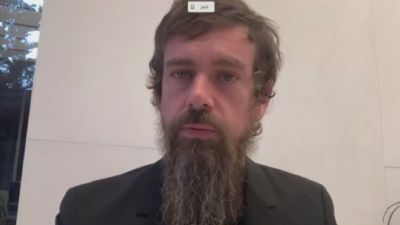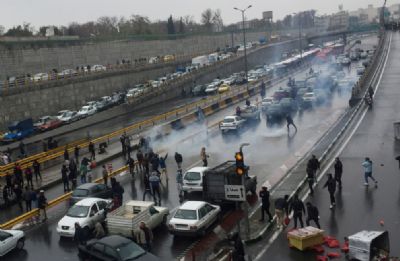Share
What's New
Resources updated Wednesday, October 28, 2020
October 28, 2020

Iranian Ayatollah Khamenei tweets Holocaust denial - again - with Twitter's permission Article

U.S. acts on declaration settlements are legal, extends deal to West Bank Article

South African Jews celebrate first criminal conviction for online antisemitism Article

Iran has imposed harsh sentences on 36 residents of a southwestern city who joined the nation's last major wave of anti-government protests in November 2019, according to a knowledgeable source who requested anonymity for fear of retaliation.
Speaking to VOA from Iran on Friday, the source said the 36 protesters from Behbahan in Khuzestan province were handed their sentences by the city's criminal court October 22. The source said the defendants were sentenced to a cumulative total of 109 years in prison and 2,590 lashes, while each individual was fined more than 3 million tomans, equivalent to roughly $700.
A copy of the verdict, provided by the source and verified by VOA Persian, showed the protesters were convicted of disturbing public order, disobeying security agents and vandalizing public property.
The source said the Behbahan court's presiding judge, Rasoul Asadpour, barred defendants and their lawyers from the courtroom for the October 12 trial session, allowing them to submit only a written defense. Prosecutors presented no evidence for many of the charges, the source asserted.
VOA could not independently confirm the circumstances of the trial because it is barred from reporting inside Iran.
There has been no comment from Iranian officials about the cases of the 36 protesters in state media this month.
VOA's source said two of the defendants, Ahmad Hatampour and Maryam Payab, previously had been sentenced to a total of 12 months in prison in a separate trial overseen by a Revolutionary Court in the southwestern city of Mahshar several months ago. The source said the Mahshar court had convicted Hatampour and Payab of spreading anti-government propaganda, and its ruling was upheld on appeal.
"The 36 Behbahan residents only were protesting against inflation and government mismanagement," the source said. The defendants, who remained free on bail, were planning to visit the Behbahan prosecutor's office in the following days to appeal their sentences, the source added.
Iran's government sparked the November 2019 demonstrations in dozens of cities nationwide by ordering a 50% increase in the subsidized price of gasoline, further straining the finances of Iranians facing high unemployment and inflation in a shrinking economy under heavy U.S. sanctions. Iranian security forces killed hundreds of protesters and arrested thousands more in a violent crackdown on the mostly peaceful demonstrations, in which some people also damaged public buildings and businesses.
The Trump administration said the protests represented the worst political crisis for Iran's Islamist rulers since they seized power in the 1979 Islamic Revolution.
Iran Sentences Protesters to Long Prison Terms, Thousands of Lashes Document

"France is increasing security at religious sites as the interior minister said Tuesday that the country faces a 'very high' risk of terrorist threats, amid growing geopolitical tensions following the beheading of a teacher who showed his class caricatures of the Prophet Muhammad.
French diplomats are trying to quell anger in Turkey and Arab nations amid anti-France protests and calls for boycotts of French goods in response to President Emmanuel Macron's firm stance against Islamism in the wake of the Oct. 16 beheading. European allies have supported Macron, while Muslim-majority countries are angered by his defense of prophet cartoons they consider sacrilegious.
France's national police have called for increased security at religious sites around the All Saint's holiday this coming weekend, particularly noting online threats from extremists against Christians and moderate French Muslims.
Interior Minister Gerald Darmanin said on France-Inter radio that the terrorist threat remains 'very high, because we have a lot of enemies from within and outside the country.'
He reiterated plans to try to disband Muslim groups seen as peddling dangerous radical views or with too much foreign financing. He accused Turkey and Pakistan in particular of 'meddling in France's internal business.'
'There is a battle against an Islamist ideology. We must not back down,' he said. But he insisted that 'the Muslim faith has all its place in the republic.'
Some members of France's largely moderate Muslim community are calling for calm, and defending the freedom of expression that the beheaded teacher was seeking to demonstrate.
The prophet cartoons deeply upset many Muslims around the world. Turkish President Recep Tayyip Erdogan has led the charge against France, questioning Macron's mental state, and France recalled its ambassador to Turkey for consultations, a first in French-Turkish diplomatic relations.
Tensions between the two countries have mounted in recent months over Turkish actions in Syria, Libya and the Caucasus Mountains region of Nagorno-Karabakh. But this new spat has quickly spread to other countries in Europe and the Muslim world.
Anti-France protests have been held from Bangladesh to the Gaza Strip, Kuwaiti stores pulled French yogurt and bottles of sparkling water from their shelves, Qatar University canceled a French culture week, and Pakistan's parliament passed a resolution condemning the publication of cartoons of the prophet.
EU officials warn that Turkey's stance could further damage its relations with key trading partners and its long-stalled efforts to join the EU.
'A boycott will only move Turkey even further away from the EU,' European Commission spokesman Balazs Ujvaris said Tuesday, insisting that Turkey needs to respect the terms of its trade deal on merchandise and goods with the EU."
France tightens security, facing 'very high' terror risk after teacher beheading Document
